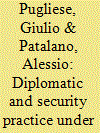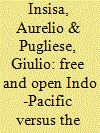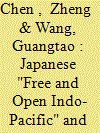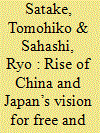|
|
|
Sort Order |
|
|
|
Items / Page
|
|
|
|
|
|
|
| Srl | Item |
| 1 |
ID:
189245


|
|
|
|
|
| Summary/Abstract |
This article examines the new prominence accorded to the “Indo-Pacific” (IP) concept in the strategic narratives championed by the US and its closest allies, (Japan and Australia), and then juxtaposes this with the responses of other key regional powers. To this purpose, Part I distils a concise conceptual model encompassing three interlocking facets – mental maps, political/ideological drivers, and visions of regional order – designed to structure the following empirical analyses. Part II then accesses this model to reveal how these facets are reflected in the discursive and policy-making practices of the US and its close allies, as embodied in their (combined) regional strategies. Next, Part III considers how a cross-section of major states in the region – India, South Korea, and China - have responded to this enterprise, to determine the degree to which they have adopted, accommodated or opposed the IP concept, or otherwise propose national alternatives to the US-centered project. It concludes that the IP concept is not simply an objective geopolitical descriptor, but rather a controversial and contested discursive field, subject to multiple interpretations. Such a polarizing concept will likely contribute to further sharpening of strategic mistrust and geopolitical competition amongst the region’s major powers.
|
|
|
|
|
|
|
|
|
|
|
|
|
|
|
|
| 2 |
ID:
175658


|
|
|
|
|
| Summary/Abstract |
In what ways are Japanese foreign and security policies changing? How far will these changes go? Will they result in a policy posture that breaks from the post-1945 approach as originally designed by Prime Minister Yoshida Shigeru? This special issue presents six articles that address these questions. They tackle the relationship between recent changes in Japanese domestic policy institutions and Japanese diplomatic and security practice. In this introduction, we outline the significance of the essays’ findings and propose a methodological shift in the interpretation of Japanese policy. We make the case that Japan’s approach to diplomatic and security affairs under Abe is evidence of the emergence of a ‘Realpolitik Japan’. From this perspective, we argue that values and political ideology have translated into practical choices that make the question of the ‘break with the post-1945’ approach less relevant to understand the significance of political change.
|
|
|
|
|
|
|
|
|
|
|
|
|
|
|
|
| 3 |
ID:
189250


|
|
|
|
|
| Summary/Abstract |
Recent scholarship suggests that the thawing of diplomatic relations between China and Japan has caused a readjustment of Beijing’s Belt and Road Initiative and Tokyo’s Free and Open Indo-Pacific Vision towards an emerging complementarity. Through careful process-tracking, elite interviews, and analysis of Chinese and Japanese primary sources, this article instead demonstrates how, outside of the East Asian spotlight, Sino-Japanese geo-economic competition continues in South Asia and the Mekong subregion, fueled by power politics and a mutual distrust of each other’s initiatives. On the basis of this evidence, this article qualifies Sino-Japanese interactions as a quest and denial for spheres of influence, whereas the Japanese government aims at denying Chinese spheres of influence. In doing so, this article highlights how Japanese proactivism from Sri Lanka to Thailand, via infrastructure and government financing, has become a driver of growing non-traditional security cooperation with India, the U.S., and Australia.
|
|
|
|
|
|
|
|
|
|
|
|
|
|
|
|
| 4 |
ID:
192545


|
|
|
|
|
| Summary/Abstract |
This article revisits the conceptualisation of (regional) order in International Relations (IR) theory to illuminate key aspects of Japan’s order-building role in the Indo-Pacific. The framework is based upon a multi-dimensional understanding of regional order-building allowing for an examination of Japan’s vision for a ‘Free and Open Indo-Pacific’ (FOIP) policy ‘vision’, the challenges it faces as a secondary power, and its conduct as an emerging entrepreneurial power in the Indo-Pacific. The article’s central argument is that Japan’s order-building should be understood in the context of the country’s deeper strategic situation and, in particular, its position as a secondary, but still highly influential, power. This has implications for understanding Japan’s approach to international order and how it might deploy norm entrepreneurship in shaping the new Indo-Pacific order.
|
|
|
|
|
|
|
|
|
|
|
|
|
|
|
|
| 5 |
ID:
188167


|
|
|
|
|
| Summary/Abstract |
Whereas Japan’s hedging vis-à-vis China in the Indo-Pacific has predominantly been the focus of academic analysis, hedging also explains Tokyo’s policy choices in the Gulf to a significant degree. Yet, existing literature has largely overlooked Japan’s hedging behaviour in the Gulf, which had to navigate the uncertainties generated by two competing powers, the United States and Iran. As hedging theory is above all concerned with risk, Japan’s policies demonstrate a concern with managing risks and the adverse consequences of misalignment or alignment. Tokyo’s attempts to serve as what former Foreign Minister Kono Taro called an “honest broker”, however, have not enabled it to shape the evolving regional security architecture. Japan’s propensity to deploy hedging more effectively in the Gulf may be shaped by domestic political considerations, pressing security challenges closer to home and personalities of key Japanese politicians such as late former Prime Minister Abe Shinzo.
|
|
|
|
|
|
|
|
|
|
|
|
|
|
|
|
| 6 |
ID:
189324


|
|
|
|
|
| Summary/Abstract |
This article examines the Chinese assessment of and responses toward the Japanese "Free and Open Indo-Pacific" (FOIP) concept against the background of evolving Sino-Japanese relations. Addressing both its security and economic concerns, the FOIP is Tokyo's top-level regional strategy design in the context of China's rise. The development of the Japanese FOIP has been fluctuating with the evolution of Sino-Japanese relations and the emerging Sino-U.S. strategic contest over the past decade. The complexity and the fluid nature of the Japanese FOIP has prompted varying assessments and policy recommendations among Chinese analysts, which can be roughly divided into three categories: the hardline approach, the hedging approach, and the docking approach. Meanwhile, remarks of Chinese officials on the Japanese FOIP remain elusive, carefully differentiating between the Indo-Pacific strategy of the United States and that of Japan. All of these aspects reveal the complexity and flexibility of China's policies. The COVID-19 pandemic and the recent domestic changes of Japan and the U.S. have further complicated geopolitical and geoeconomic tensions. As a consequence, the Sino-Japanese relationship has become awkward once again.
|
|
|
|
|
|
|
|
|
|
|
|
|
|
|
|
| 7 |
ID:
178696


|
|
|
|
|
| Summary/Abstract |
Unlike the common view that sees FOIP as a containment strategy against China, this article argues that Japan’s FOIP vision seeks to maintain an open and inclusive regional order that incorporates all regional countries into a common framework. To realize such a vision, Japan has strengthened its regional order-building efforts with other regional like-minded countries. However, such efforts have limitations in terms of the resource shortage, legal constraints, and the lack of regional consensus. Unless Japan can address these challenges, the FOIP would end up being a mere utopian dream, rather than a meaningful vision or strategy that can prevent the emergence of a Cold War and maintain an inclusive and rules-based order in the region.
|
|
|
|
|
|
|
|
|
|
|
|
|
|
|
|
|
|
|
|
|